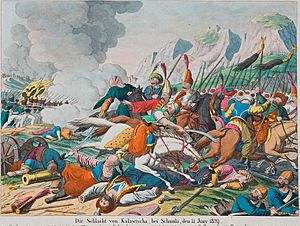Battle of Kulevicha facts for kids
Quick facts for kids Battle of Kulevicha |
|||||||
|---|---|---|---|---|---|---|---|
| Part of the Russo-Turkish War | |||||||
 Battle of Kulevicha |
|||||||
|
|||||||
| Belligerents | |||||||
| Commanders and leaders | |||||||
| Hans Karl von Diebitsch | Reşid Mehmed Pasha | ||||||
| Strength | |||||||
| 26,000 Russians 7,000 Moldavians and Wallachians |
40,000 | ||||||
| Casualties and losses | |||||||
| 1,000 killed and wounded | 5,000 killed | ||||||
The Battle of Kulevicha was a key event in the Russo-Turkish War. It is also known as the Battle of Kulevcha. This important battle took place on June 11, 1829. It was fought between the forces of the Russian Empire and the Ottoman Empire. The battle happened near the village of Kulevicha, which is now in modern-day Bulgaria.
Contents
The Battle of Kulevicha
The Russian army was led by General Hans Karl von Diebitsch. He was a German-born general serving the Russian Empire. Their goal was to help the city of Varna. Varna was about 40 miles west of Kulevicha and was under attack.
Ottoman Forces and Their Goals
The Ottoman forces were commanded by Reşid Mehmed Pasha. He was a high-ranking general from Georgia. The Ottoman army had several important tasks in Bulgaria. One main goal was to stop local uprisings. They also needed to relieve Varna from constant fighting. Another key mission was to prevent the Russian army from moving further into Bulgaria.
How the Battle Unfolded
General Diebitsch marched his Russian troops towards the Ottomans. The battle was fierce. The Ottoman soldiers found themselves trapped in a valley. This made it very difficult for them to fight effectively. They suffered many losses during the battle.
Russian Victory and Aftermath
The Russians achieved a clear victory. The Ottoman forces had to retreat after suffering heavy casualties. After this important win, General Diebitsch continued his advance. His next target was the city of Adrianople. This victory at Kulevicha was a significant step for the Russians in the war.
 | May Edward Chinn |
 | Rebecca Cole |
 | Alexa Canady |
 | Dorothy Lavinia Brown |

